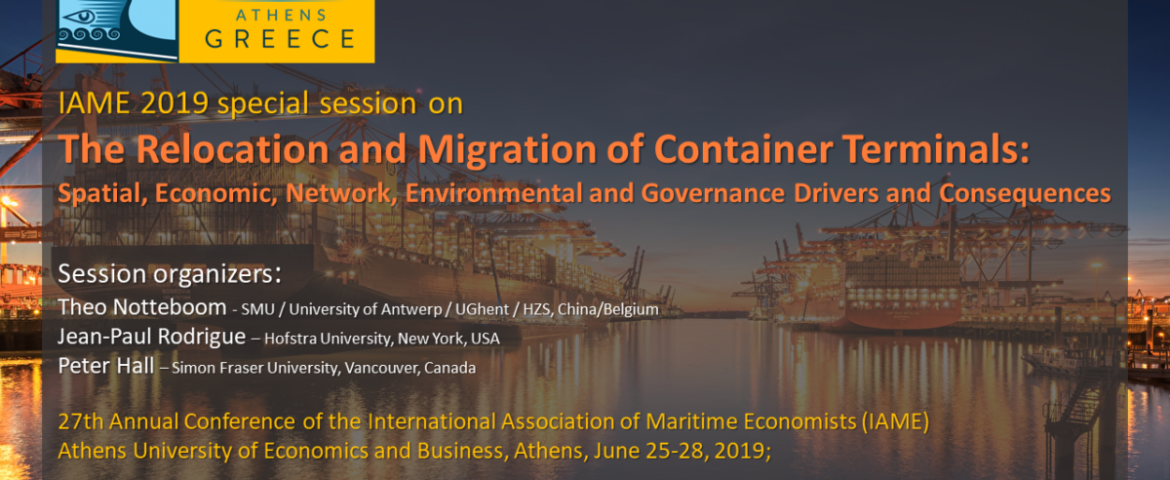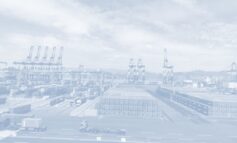Call for papers
IAME 2019 special session on “The Relocation and Migration of Container Terminals: Spatial, Economic, Network, Environmental and Governance Drivers and Consequences”
Session organizers:
Theo Notteboom – SMU / University of Antwerp / UGhent / HZS, China/Belgium
Jean-Paul Rodrigue – Hofstra University, New York, USA
Peter Hall – Simon Fraser University, Vancouver, Canada
Since the beginning of containerization, port activities leaving the urban core for less congested suburban or peripheral port sites has been an enduring, but not universal, characteristic of port development. For ports within urban areas this typically implies a development (downstream on a river, lateral along a coastline or outward in the sea through land reclamation) away from the obsolete facilities near the urban core to less urban locations with ample space and a better nautical accessibility (such as described in the early Anyport-model of Bird, 1971). In a more extreme form, a trend towards deconcentration in port systems can be observed as a result of the ‘challenge of the periphery’ (Slack, 1981), a concept which was empirically tested by Notteboom (2005) for Europe and Slack and Wang (2002) for Asia. Such port/terminal migration and relocation processes can thus take various forms.
There are multiple possible drivers for port migration and relocation such as; (a) the need for deep water access to accommodate ever larger vessels; (b) the need for locations that offer a better intermediacy in liner shipping networks; (c) diseconomies of scale and land availability issues at existing port areas; (d) additional real estate for terminal operations and supporting logistical activities in light of traffic growth; (e) better accessibility to regional transportation such as highways, rail or barge; (f) urban/city development dynamics; (g) cost differentials between existing and new locations in terms production factors capital, labour and or land; (h) environmental restrictions at established ports; (i) competition between incumbent and entrant terminal operators; and (j) political and administrative issues in existing jurisdictions. However, there might also be forces preventing port migration. For example, existing ports and terminals might have a closer proximity and better connectivity to inland markets and might have a better cargo generating potential.
During the IAME2019 conference in Athens, Greece, we intend to organize a session on the theme of container terminal relocation and migration of container terminals and ports. We seek full paper contributions and extended abstracts that will increase our understanding of the following issues (non-exhaustive):
- The types/forms of port (terminal) relocation and migration and the related choice problem between in situ intensification and port redesign/relocation;
- The triggers/drivers of, delaying factors in, and outright impediments to port relocation/migration schemes: e.g. spatial/nautical factors, economic factors (macro and micro-economic), environmental issues, governance-related issues, etc.;
- The institutional, political and market/commercial dynamics behind successful and failed port relocation/migration schemes;
- The ‘regionalism’ of port relocation/migration schemes (i.e. the role of the regional setting in the choice, success and failure of port relocation/migration schemes);
- Stakeholder perspective on port relocation/migration, including also the problems of implementation and the potential conflicts (power, prestige, social, economic, environmental, etc.) with internal and external stakeholders;
- The impact of port migration and relocation on the environmental footprint of ports;
- The impact of port migration and relocation on landside connective infrastructures;
- The impact of port co-operation schemes on port relocation/migration;
- Changes in shipping network dynamics such as direct calls and transshipment on port relocation/migration.
This session is organized in the context of the project “Green Shipping: Governance and Innovation for a Sustainable Maritime Supply Chain” funded by Social Sciences and Humanities Research Council of Canada (SSHRC) project (N◦ 895-2017-1003). As session organizers, we are looking for original contributions that are well grounded in theory and/or containing novel analysis that will provide new perspectives on port relocation/migration trends and their impacts.
Potential contributors are asked to submit an abstract following the regular submission schedule as published on the IAME2019 conference website https://www.dept.aueb.gr/en/iame2019 . You can opt for a full paper or extended abstract. During the uploading of the abstract kindly mention that the abstract is related to the special session. You are invited to concisely follow the author guidelines of IAME2019 which can be found online. It would be helpful if you could also inform the session organizers on the submitted abstract via e-mail to [email protected] ; [email protected]; and [email protected].
It is the intention of the session organizers to edit a special volume on the theme in a high-ranked journal after the IAME2019 conference. Authors of high-quality papers and extended abstracts will be invited to submit their full papers for the planned special volume.












